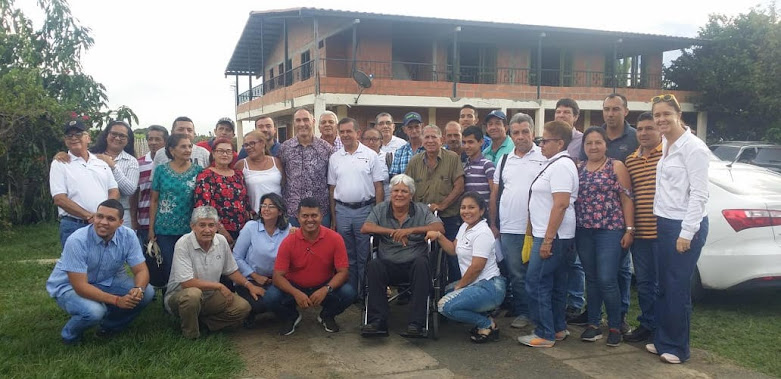Motivating Grape Producers to Innovate in Colombia
One of F2F Colombia’s most important partner organizations is
CorpoValle, a non-profit development agency focused on agricultural development
projects in Colombia’s Valle del Cauca department. They support 65 smallholder
agricultural associations comprised of 3,200 fruit and vegetable growers from
29 municipalities, impacting approximately 12,000 people. F2F Colombia has
completed eight volunteer assignments with 11 different associations under
CorpoValle.
One of these was with ASOPROUVAS, a smallholder farmer association that
produces Isabella grapes in the El Cerrito municipality. ASOPROUVAS currently
works with 50 producers that grow about 600 tons of grapes every six months. Although
about 90% of the ASOPROUVAS associates are actively involved in the
organization, by December of 2019, when the volunteer arrived, most were still
selling their produce independently. Individual selling is an issue because it
increases the likelihood of opportunistic behavior by buyers, reduces their
market power, and prevents them from achieving economies of scale to reduce
their costs.
The volunteer that flew to Colombia to support ASOPROUVAS is Bryan
Dodson. Bryan holds a master’s degree in Management Science and has been a
Farmer-to-Farmer volunteer more than 30 times in Central Asia, Africa, Eastern
Europe, and Central America. Before his assignment, Bryan had several online
meetings with representatives from ASOPROUVAS and conducted a market analysis
of grape and grape-related goods in the U.S. to analyze the potential to
develop new products. These included goods not produced or commercialized in
Colombia, and seeing them motivated the farmers to innovate. As ASOPROUVAS’
President, Jaime Arana explained, “Bryan opened their eyes to the possibility
of diversifying their products”.
 |
| F2F Volunteer Bryan Dodson and ASOPROUVAS' President Jaime Arana presenting together. |
Once in El Cerrito, Bryan toured their pulp processing plant and visited
a table grape sorting and distribution center, a juice processing facility, and
the country’s largest pulp producer. Bryan also conducted an in-country market
survey and held meetings with ASOPROUVAS representatives and potential
commercial partners. He explained to the association the importance of finding
common buyers and selling collectively to guarantee better prices and stable
incomes. Since January 2020, most of the associates have come together to sell
15 tons of grapes per week; five tons go to a purchaser for supermarket
stocking in Medellin and 5 tons are purchased by a pulp processing plant. By
selling together they guarantee purchasing as well as higher prices.
At the end of his assignment, Bryan recommended that they identify
potential needs and customers and strategically create offerings to meet new
market demands. Following Bryan’s recommendations, some of ASOPROUVA’s
producers decided to sell their table grapes in small trays that could easily
be sold in supermarkets for household consumption. At the end of July, these
producers signed an agreement with one of the biggest supermarket chains of the
region and received the first order of 2,500 trays!
 |
| Preparing the trays of table grapes, in July 2020. |
Members from ASOPROUVAS have said that Bryan’s support and advice was
vital, as it made them feel proud of their work as farmers and motivated them
to work hard to benefit their fellow members. They also credit his support with
empowering them to come together to grow, both personally and collectively. It
was this confidence that encouraged them to ask Colombia’s National Institute
for Learning (Servicio Nacional de Aprendizaje – SENA) for support, which
agreed to provide them with free trainings on drip irrigation and Good
Agricultural Practices (GAPs). This will help them to comply with
certifications and will guarantee better prices.
Although Bryan’s recommendations have only been implemented for a few
months, Mr. Arana says that they can already feel the difference. The farmers
are less stressed, and their client base has expanded. Mr. Arana credits Bryan
with “igniting that spark that motivated them to commercialize their produce
after being too scared to do so for 17 years”. ASOPROUVAS remembers Bryan’s
advice with gratitude and positivism.
Through volunteers like Bryan Dodson, USAID’s Farmer-to-Farmer Program supports smallholder farmers in developing countries that promote local economic development while improving the quality of life of those most in need.



.png)

Comments
Post a Comment